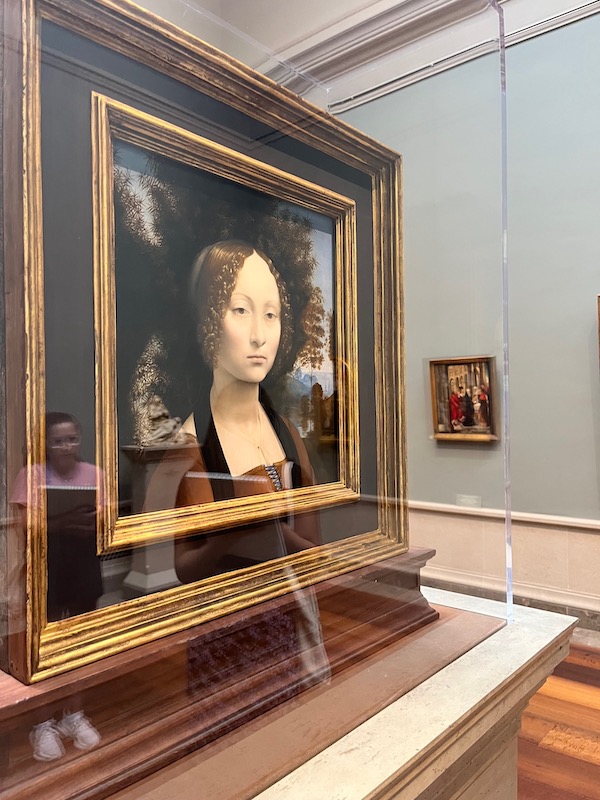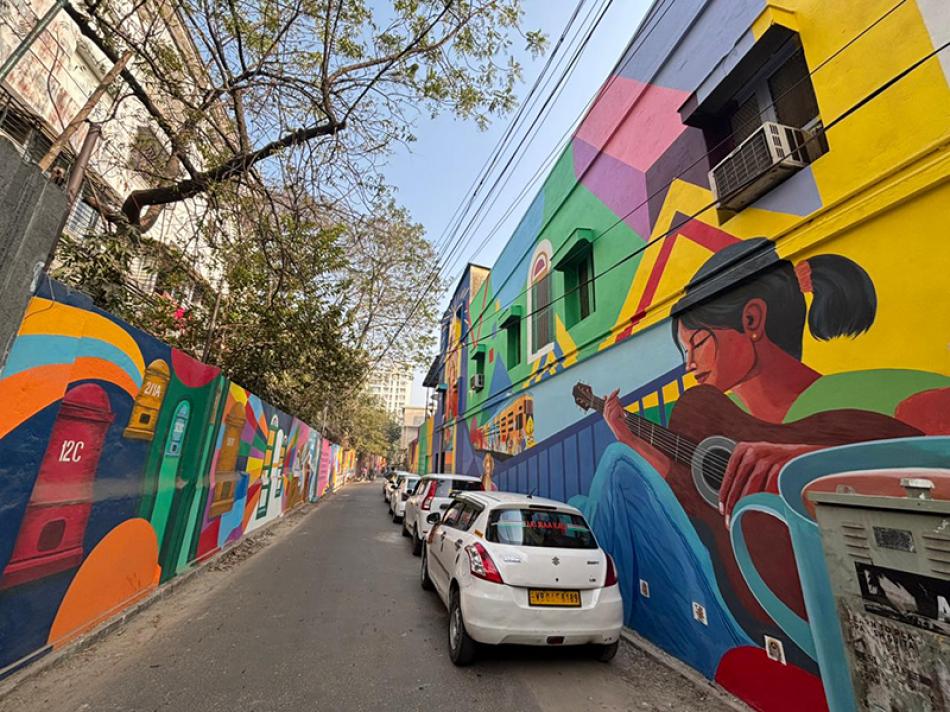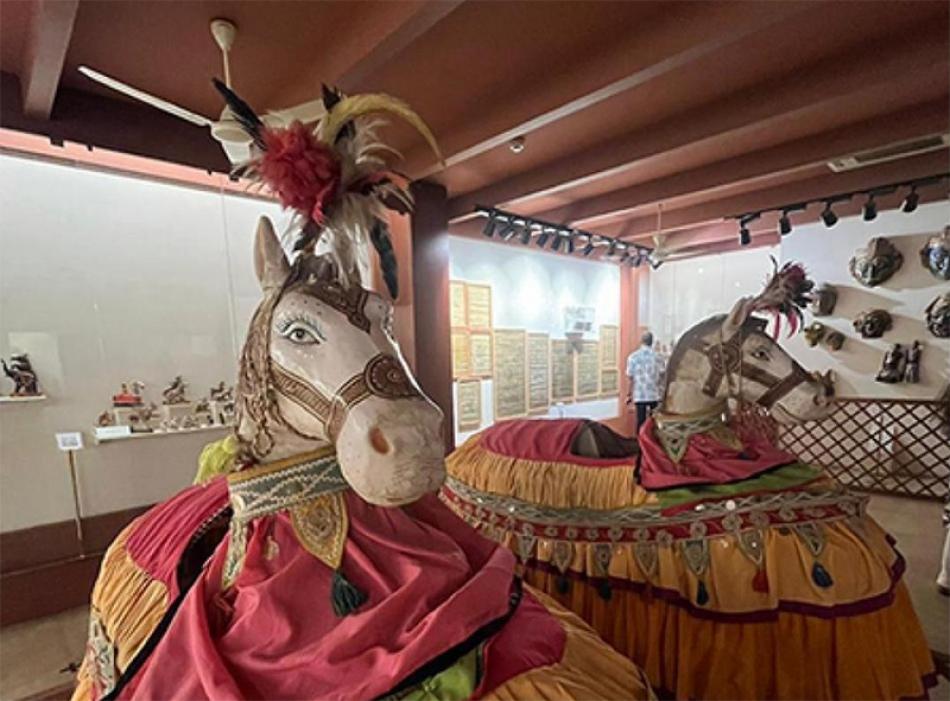Sujoy Dhar | @notintownlive | 14 Nov 2023, 01:12 pm
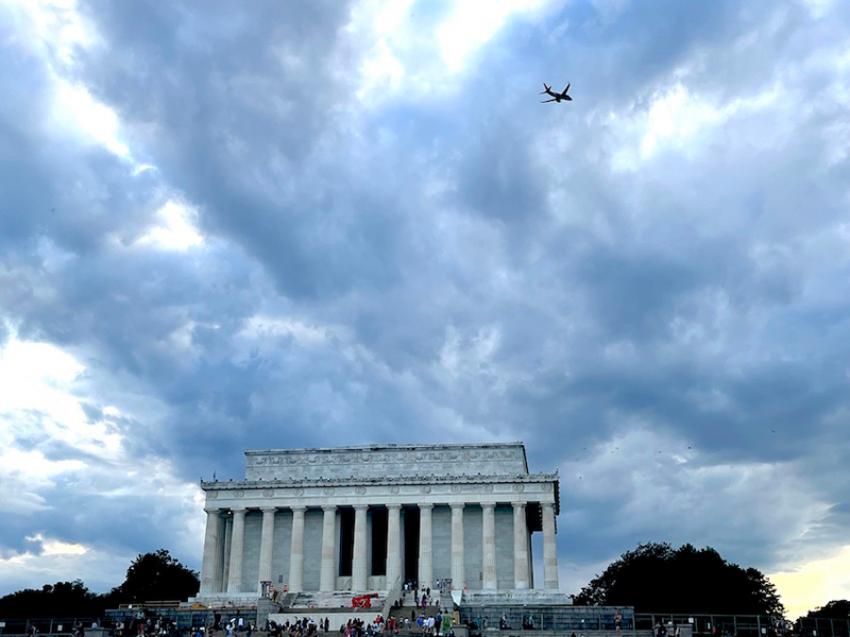
The Lincoln Memorial is in the middle of Washington, D.C. in the large park area known as the National Mall. Image by the author.
Securing a vantage seat in the upper deck of a hop-on-hop-off bus (read Big Bus Tours), you can feel like just another average visitor to Washington DC doing some touristy things.
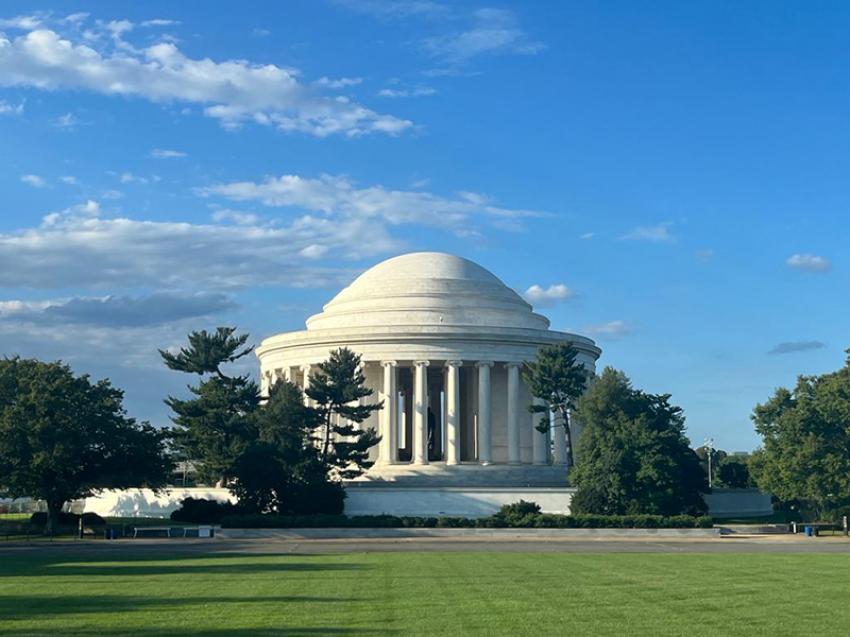 Image: Situated on the Tidal Basin, the Thomas Jefferson Memorial, dedicated by President Roosevelt on April 13, 1943, stands in a straight line with the White House. Architect John Russell Pope designed it influenced by Jefferson's taste in classical architecture. Thomas Jefferson was the primary author of the Declaration of Independence, first Secretary of State for the United States of America, and a complex, 19th-century man with a wide ranging impact on the very makeup of America itself.
Image: Situated on the Tidal Basin, the Thomas Jefferson Memorial, dedicated by President Roosevelt on April 13, 1943, stands in a straight line with the White House. Architect John Russell Pope designed it influenced by Jefferson's taste in classical architecture. Thomas Jefferson was the primary author of the Declaration of Independence, first Secretary of State for the United States of America, and a complex, 19th-century man with a wide ranging impact on the very makeup of America itself.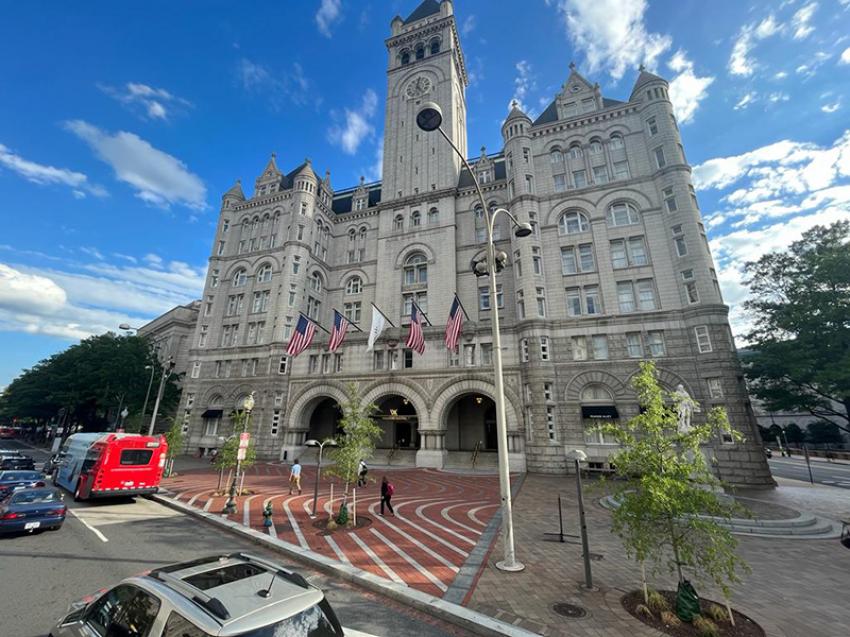 Image: Explore Washington DC from the upper deck of hop-on-hop-off tour of Big Bus.
Image: Explore Washington DC from the upper deck of hop-on-hop-off tour of Big Bus. I actually ended up spending most of my time at the Lincoln Memorial overlooking the grand vista of the National Mall.
Lincoln Memorial and a walk to National Mall
So I hopped off at the Lincoln Memorial entry point. What followed that late afternoon to evening is a relaxed experience of loafing about while exploring. So here you are at the memorial to Abraham Lincoln, who was assassinated on April 14, 1865, just as the Civil War was ending.
According to the National Park Service (NPS), which administers the memorial and the National Mall zone at large, by March of 1867, Congress incorporated the Lincoln Monument Association to build a memorial to the slain 16th president.
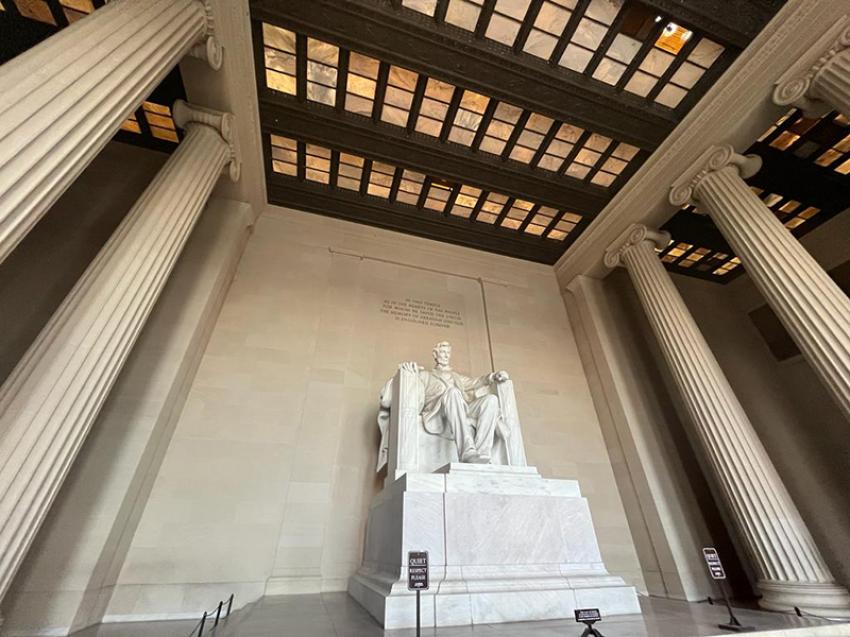 Image: The statue of Abraham Lincoln, originally intended to be only 10 feet tall, was on further consideration enlarged so that it finally stood 19 feet tall from head to foot.
Image: The statue of Abraham Lincoln, originally intended to be only 10 feet tall, was on further consideration enlarged so that it finally stood 19 feet tall from head to foot.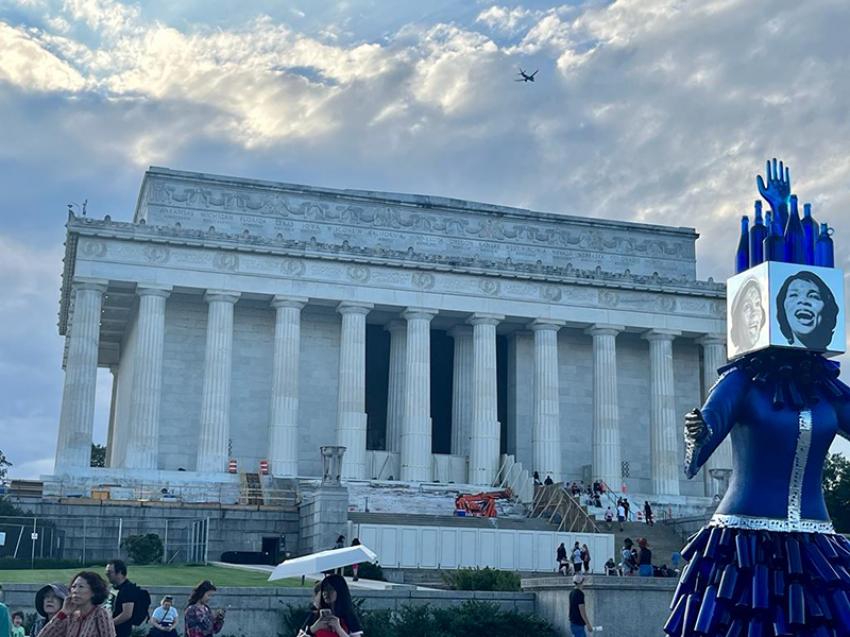 Image: The memorial to Abraham Lincoln, who was assassinated on April 14, 1865, just as the Civil War was ending, is a DC landmark.
Image: The memorial to Abraham Lincoln, who was assassinated on April 14, 1865, just as the Civil War was ending, is a DC landmark.
"All foundation work was completed in May 1915. Earlier that year work had started on the main structure itself and fill was brought in to build up the circular mound that would be the landscape setting for the memorial. Work continued at a steady pace until April 1917, when the United States entered World War I.
"Work slowed considerably because of labor and material shortages but never came to a halt. In 1918, after all parties agreed that the statue of Lincoln would have to be doubled in size so that it would not appear lost in the building, steel struts were added beneath the floor to support the added weight from the larger statue," it says.
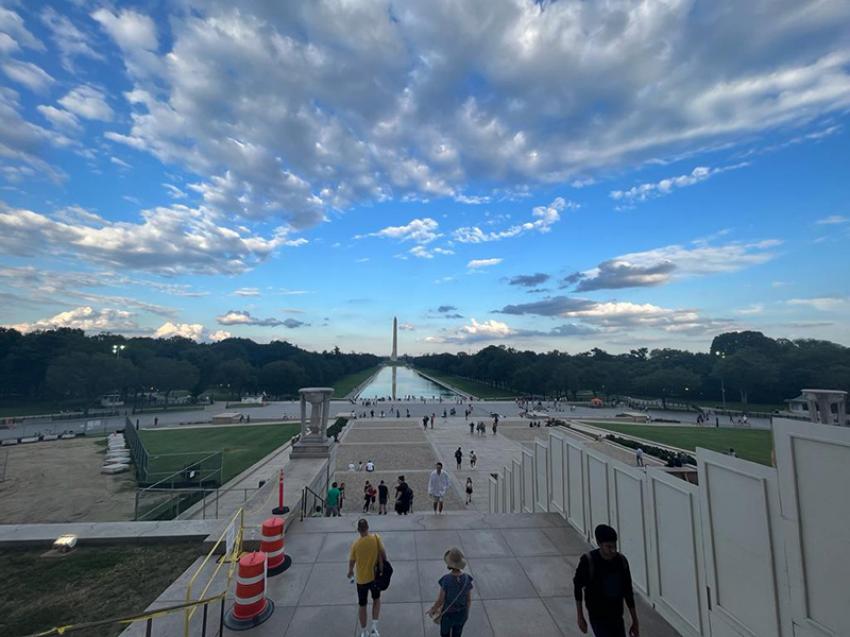 Image: The Lincoln Memorial overlooks the grand vista of the National Mall.
Image: The Lincoln Memorial overlooks the grand vista of the National Mall.By the time of the dedication on May 30, 1922, all the work was done except for completing the pool and the interior lighting which were finished within the next few years, the NPS site says.
While I was googling all these nuggets of information at the memorial to get a sense of history at the landmark spot, the vista that lay ahead and leads you to the The Washington Monument was inviting me for that leisurely walk.
The Washington Monument is the heart of the National Mall, and often called America’s front yard. The National Mall, a landscaped park that borders a number of museums of the Smithsonian Institution, art galleries, cultural institutions, and contains the various memorials, sculptures, and statues, brings America's past, present and future together.
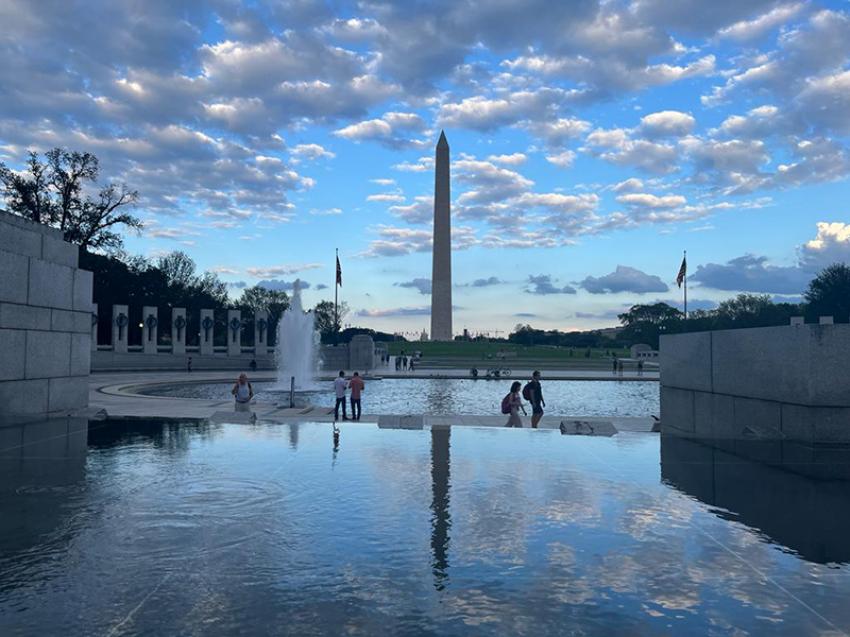 Image: A twilight view of the Washington Monument in the National Mall.
Image: A twilight view of the Washington Monument in the National Mall. So I started walking from the Lincoln Memorial to The Washington Monument, which rises majestically to the sky surrounded by a ring of flags fluttering in the gentle breeze of that evening.
The Washington Monument honours and memorialises George Washington, the military officer, statesman and the founding father of America who served as the first president of the United States from 1789 to 1797. The monument at the centre of DC in the National Mall, was completed in two phases of construction, one private (1848-1854) and one public (1876-1884).
Built in the shape of an Egyptian obelisk, evoking the timelessness of ancient civilizations, the Washington Monument embodies the reverence and gratitude the nation felt for its Founding Father. When completed, the Washington Monument was the tallest building in the world at 555 feet, 5-1/8 inches.
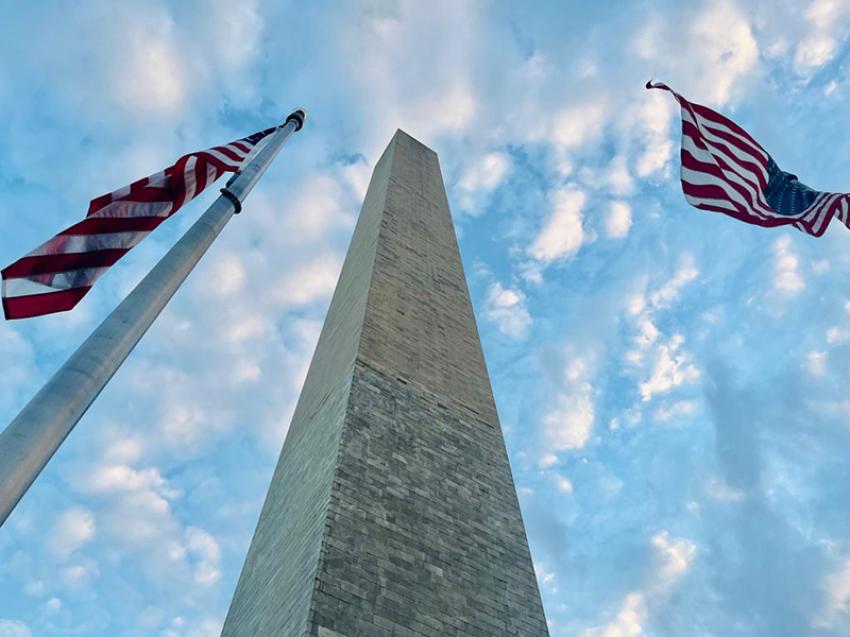 Image: The Washington Monument rises majestically in the National Mall.
Image: The Washington Monument rises majestically in the National Mall.
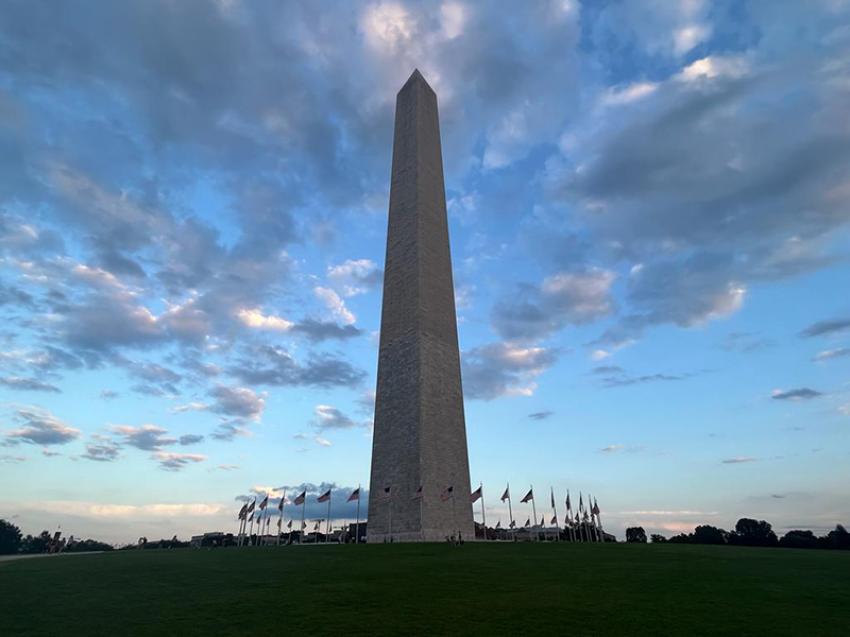 Image: The Washington Memorial is in the heart of the National Mall.
Image: The Washington Memorial is in the heart of the National Mall.
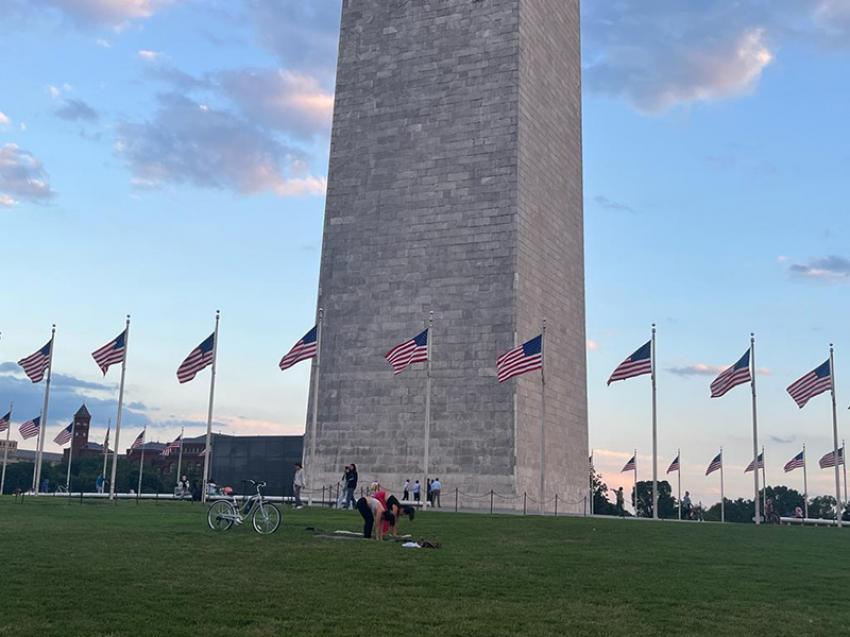 Image: Flags encircling the Washington Monument.
Image: Flags encircling the Washington Monument.
As I lay on the grassy ground of the National Mall and looked up at the flags circling the Monument, the sun was quietly setting, caressing us with its golden colours.
The Smithsonian museums: One at a time
National Museum of Natural History
I began my day with the National Museum of Natural History administered by the Smithsonian Institution of just Smithsonian, which is a group of museums, education and research centres, the largest such complex in the world, created by the U.S. government "for the increase and diffusion of knowledge."
As you enter the museum, look for the three things. Straight ahead you find Henry the 11-ton, 13-foot-tall African elephant gracing the main atrium since 1959; looking upward see the ornate four-story museum rotunda; and then do not miss the big Hope Diamond exhibit on the museum’s second floor. The blue diamond was extracted in the 17th century from the Kollur Mine in Guntur, India.
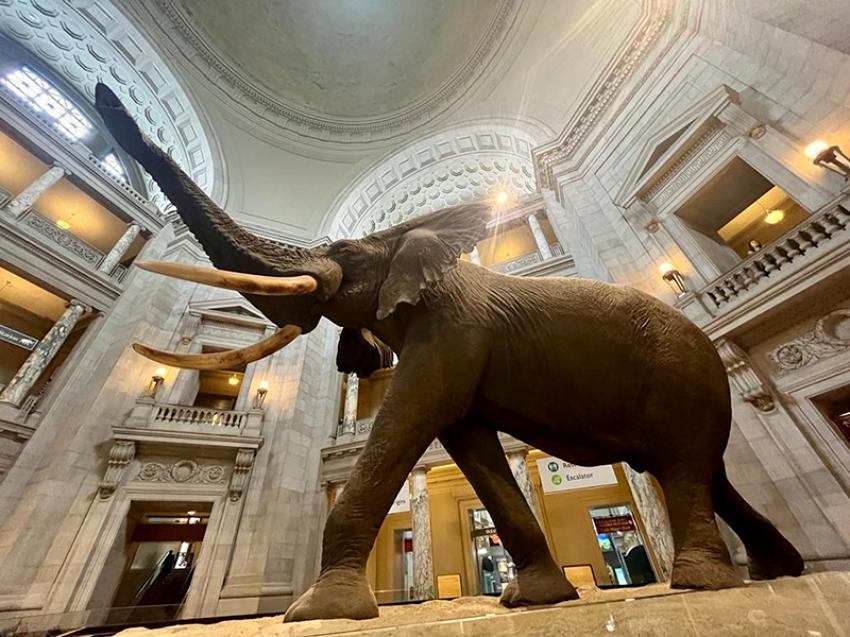 Image: Henry the 11-ton, 13-foot-tall African elephant graces the rotunda since1959.
Image: Henry the 11-ton, 13-foot-tall African elephant graces the rotunda since1959.
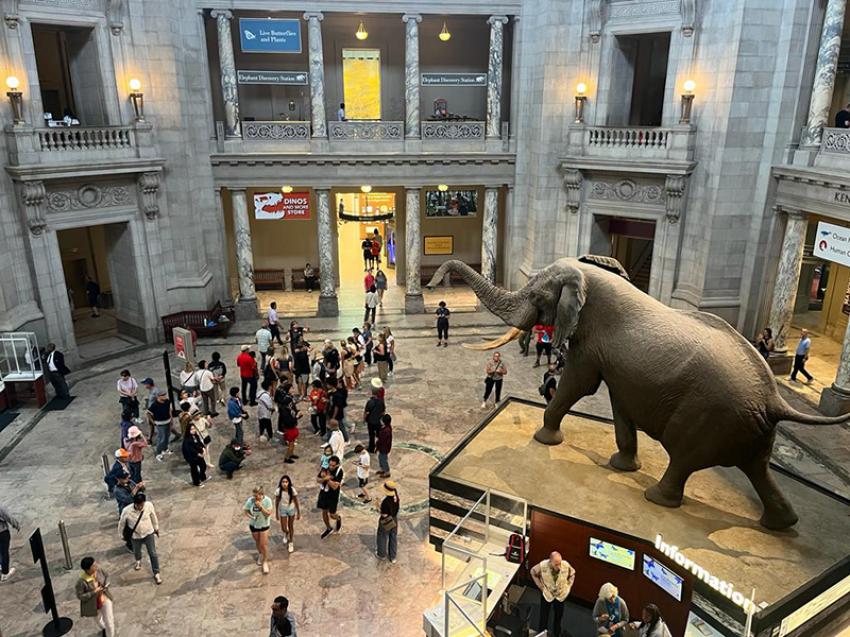 Image: Henry was donated by a Hungarian game hunter.
Image: Henry was donated by a Hungarian game hunter.
The museum stewards a collection of 148 million specimens and artifacts. Each one reflects a moment in space and time telling the Earth’s story.
Henry the African elephant lording over the rotunda is also sometimes called the Fénykövi elephant, after the Hungarian game hunter who donated the hide.
Next, explore Earth's Treasures. Inside this 20,000-square-foot exhibition, you can explore from the centre of the Earth to the vast reaches of the solar system.
(In image below: The Hope Diamond was found in India's Guntur. It is one of the Golconda diamonds with earliest record showing it was bought by a French gem merchant in 1666.)
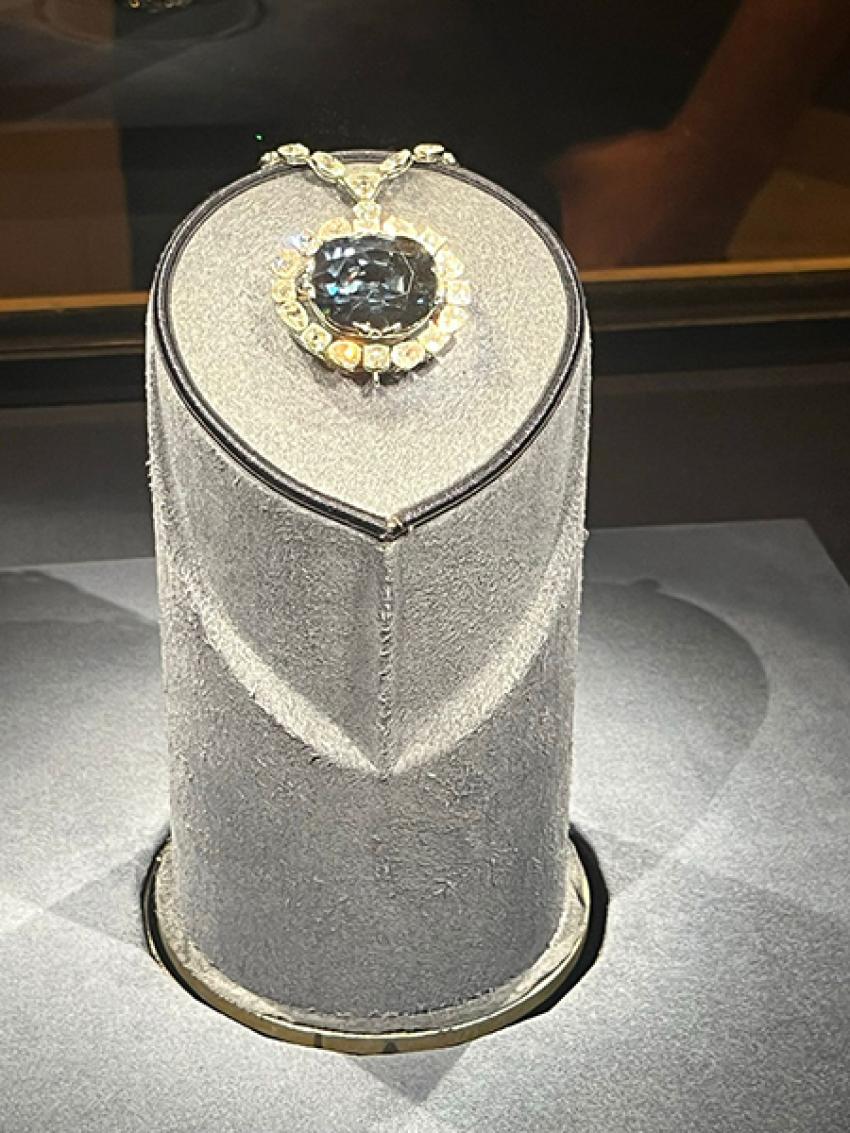
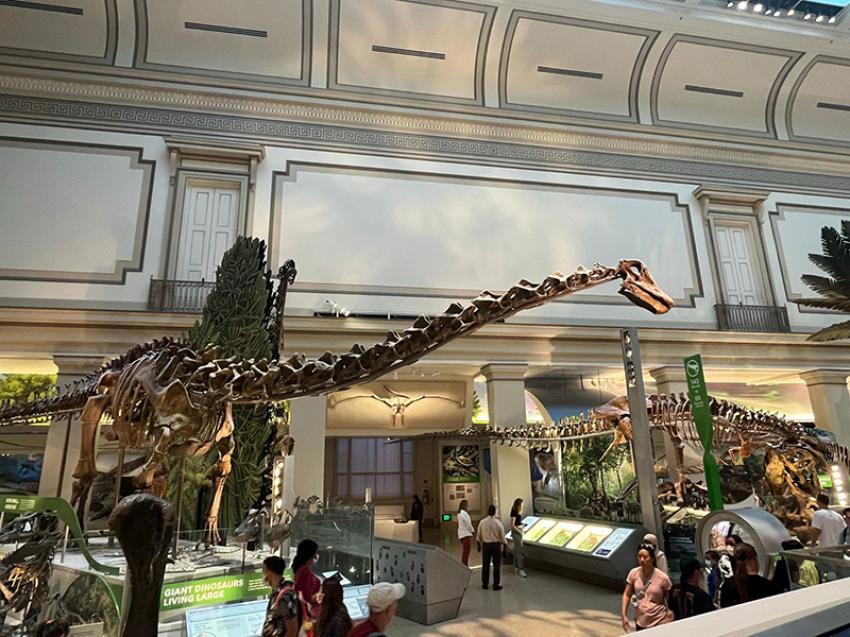 Image: Diplodocus is among the most easily identifiable dinosaurs, with its typical sauropod shape, long neck and tail, and four sturdy legs. The fossils of the dinosaur was discovered in 1877.
Image: Diplodocus is among the most easily identifiable dinosaurs, with its typical sauropod shape, long neck and tail, and four sturdy legs. The fossils of the dinosaur was discovered in 1877.
See the sparkling highlights of the National Gem Collection, including the 168-carat Mackay emerald and diamond necklace and the massive Carmen Lúcia ruby (one of the largest rubies ever found). Learn how meteorites brought minerals to Earth. See lava and ash samples from three famous volcanoes. Explore gem and mineral specimens of every size, shape, and colour of the rainbow.
The Fossil Hall of the museum is towered by a giant dinosaur- Diplodocus Longus. According to the Smithosian archive, the bones comprising the dinosaur were collected mostly in the Dinosaur National Monument in Utah in 1923, and over the next seven years were prepared and mounted. It was installed in the exhibit hall in 1931.
The National Gallery of Art
The National Gallery of Art on Constitution Avenue NW on the periphery of the National Mall is another Smithsonian museum you cannot miss in DC. Here you can experience some of the most vital art in the world.
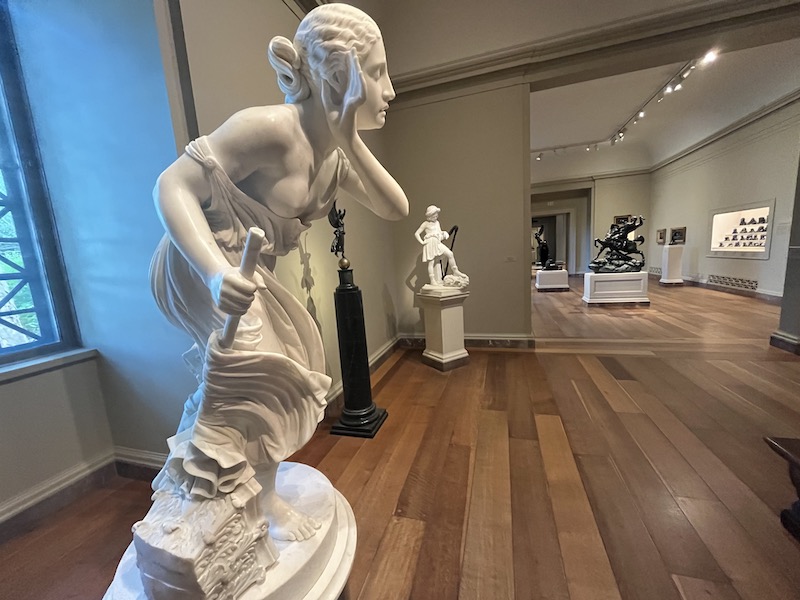
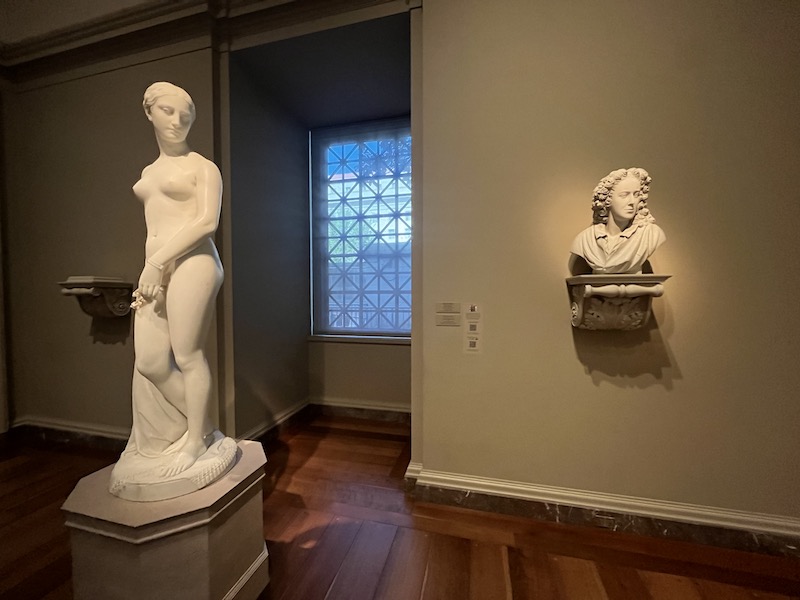
Through its East and West Buildings, the museum preserves, collects and exhibits works of art from numerous countries and historical eras. Its collection features roughly 141,000 paintings, drawings, photographs, sculptures and forms of new media that stretch all the way back to the Middle Ages.
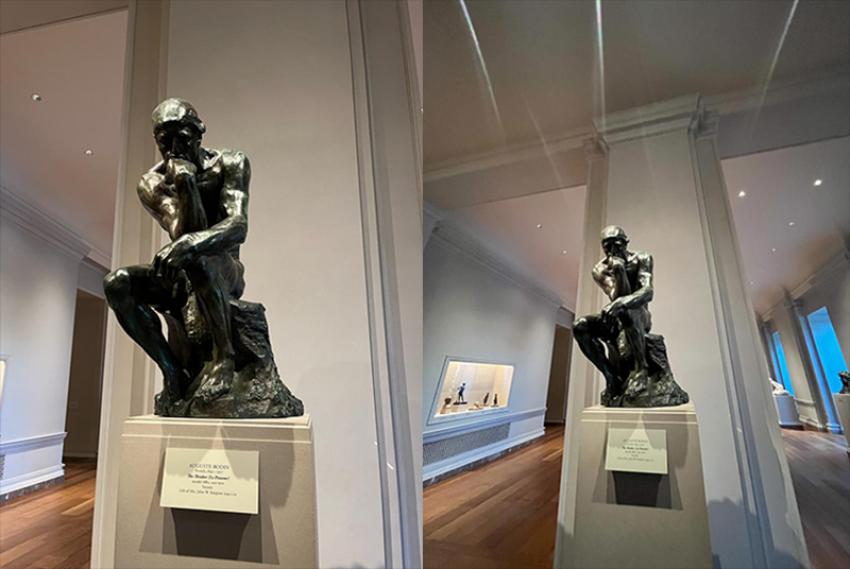 Image: French sculptor Auguste Rodin's famous work, The Thinker.
Image: French sculptor Auguste Rodin's famous work, The Thinker.
Besides some ongoing temporary exhibitions, the museum contains some of the most celebrated artworks of the world- from the Renaissance masters to modern-day masterpieces.
I got a chance to revisit the works of French sculptor Auguste Rodin whose works were exhibited in my home town Kolkata many decades ago. At the National Gallery of Art you encounter some of his most famous works, including The Thinker and The Kiss.
"Rodin shaped bodies that convey significant emotion, from mental anguish to desire, via details such as furrowed brows, hunched back muscles, and suggestions of touch," writes Artsy.net, the leading marketplace for art by the world’s emerging and established artists, on The Thinker.
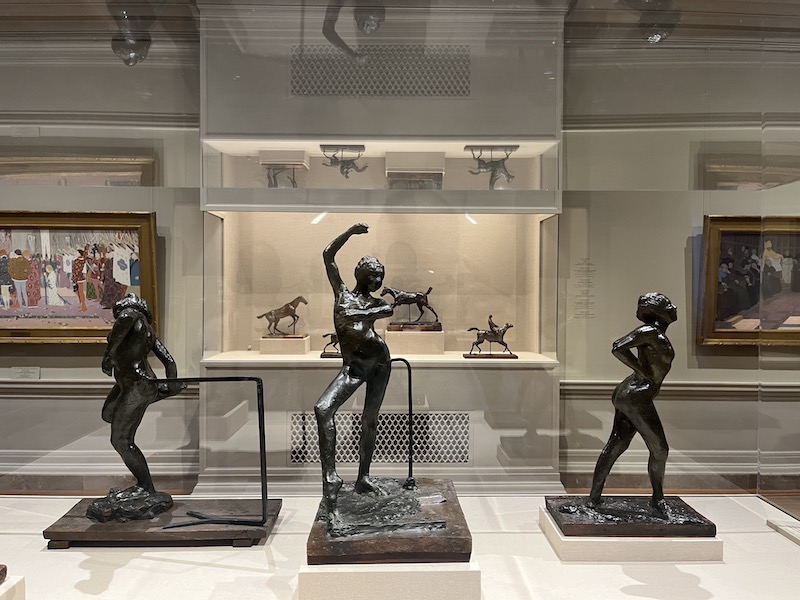
.jpg)
.jpg)
At the gallery here, you come across some of the seminal works of Leonardo da Vinci.
Leonardo da Vinci's Ginevra de' Benci [obverse], c. 1474/1478 is on display in the West Building's Main Floor at Gallery 39.
.jpg)
.jpg)

- Tour the U.S. Capitol.
- Explore museums around the National Mall
- Peddle boating in the Tidal Basin by the National Mall
- Find a DC Mural Tour in the NoMa neighbourhood and around Union Market
- See the Lincoln Memorial and laze around the Washington Monument (National Mall)
- Tour the quaint Embassy Row where around 170 embassies are located
- Explore Theodore Roosevelt Island
- Visit President Lincoln's home and Ford Theater where he was shot in 1865
- Visit Rock Creek Park
- Visit Smithsonian Zoological Park
The writer is the Roving Group Editor of India Blooms News Service (IBNS) of which Not In Town is an affiliate. He can be reached on sujoydhar@gmail.com. All images by the author.
- This City is Quietly Redefining What a Holiday Experience Looks Like
- Saigon Sisters in Chicago — A Dumplings & Bao Love Story
- Beyond Old and New: Bickram Ghosh and the Art of Fusion at Serendipity
- From Kennedy’s Proposal to 1850s Saloons: The Three Historic D.C. Restaurants Everyone Must Try
- This city has the best bagel in the US, and it’s not New York!
- I escaped to Pachmarhi — what I found in the queen of Satpura left me spellbound
- Air Canada just ranked the Best New Restaurants of 2025 - And the Top Spot isn't who you think
- Rediscovering Arunachal's Monpa Cuisine: One Woman’s Millet Momo Revolution
- Discovering Heritage: A visual journey through Odisha crafts museum Kalabhoomi
- From kebabs to biriyani: Lucknow gets UNESCO honour for its royal cuisine
Lufthansa will mark its 100th anniversary in 2026, commemorating a century since the founding of the original “Luft Hansa” on January 6, 1926. The airline’s first flight followed shortly after, on April 6 of the same year, marking the beginning of what would become one of aviation’s most recognisable brands.
Tata Group-owned Air India on Tuesday announced a new, unilateral codeshare partnership with airBaltic, the flag carrier of Latvia, thus making the Baltic region more conveniently accessible for Air India customers.
Air India Express, India’s first international value carrier, has rolled out its monthly, ‘PayDay Sale’, offering special fares across its domestic and international network.

